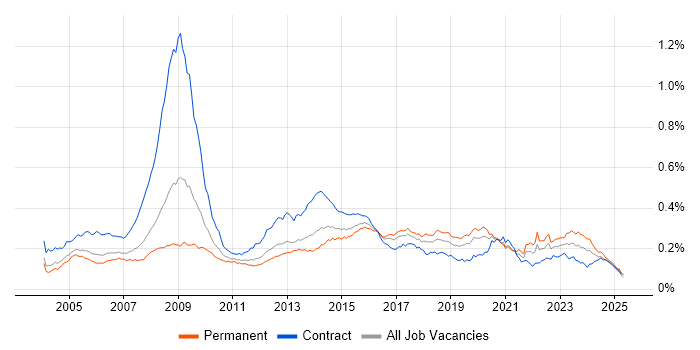Information Analyst
UK > England
The median Information Analyst salary in England is £63,000 per year, according to job vacancies posted during the 6 months leading to 5 June 2025.
The table below provides salary benchmarking and summary statistics, comparing them to the same period in the previous two years.
| 6 months to 5 Jun 2025 |
Same period 2024 | Same period 2023 | |
|---|---|---|---|
| Rank | 649 | 667 | 673 |
| Rank change year-on-year | +18 | +6 | +149 |
| Permanent jobs requiring an Information Analyst | 49 | 186 | 220 |
| As % of all permanent jobs advertised in England | 0.099% | 0.20% | 0.26% |
| As % of the Job Titles category | 0.11% | 0.21% | 0.29% |
| Number of salaries quoted | 41 | 162 | 173 |
| 10th Percentile | £42,500 | £38,200 | £40,000 |
| 25th Percentile | £51,250 | £43,188 | £45,000 |
| Median annual salary (50th Percentile) | £63,000 | £52,500 | £50,000 |
| Median % change year-on-year | +20.00% | +5.00% | - |
| 75th Percentile | £67,500 | £66,938 | £57,500 |
| 90th Percentile | £75,000 | £77,500 | £68,500 |
| UK median annual salary | £60,000 | £52,500 | £50,000 |
| % change year-on-year | +14.29% | +5.00% | +9.89% |
All Permanent IT Job Vacancies
England
For comparison with the information above, the following table provides summary statistics for all permanent IT job vacancies in England. Most job vacancies include a discernible job title that can be normalized. As such, the figures in the second row provide an indication of the number of permanent jobs in our overall sample.
| Permanent vacancies in England with a recognized job title | 44,846 | 86,927 | 76,153 |
| % of permanent jobs with a recognized job title | 90.81% | 94.76% | 91.26% |
| Number of salaries quoted | 23,726 | 63,920 | 49,817 |
| 10th Percentile | £28,949 | £28,500 | £32,500 |
| 25th Percentile | £40,748 | £38,084 | £45,000 |
| Median annual salary (50th Percentile) | £55,000 | £52,500 | £60,567 |
| Median % change year-on-year | +4.76% | -13.32% | +0.95% |
| 75th Percentile | £73,750 | £70,500 | £81,250 |
| 90th Percentile | £96,250 | £90,000 | £100,000 |
| UK median annual salary | £55,000 | £52,500 | £60,000 |
| % change year-on-year | +4.76% | -12.50% | - |
Information Analyst
Job Vacancy Trend in England
Job postings that featured Information Analyst in the job title as a proportion of all IT jobs advertised in England.

Information Analyst
Salary Trend in England
3-month moving average salary quoted in jobs citing Information Analyst in England.
Information Analyst
Salary Histogram in England
Salary distribution for jobs citing Information Analyst in England over the 6 months to 5 June 2025.
Information Analyst
Job Locations in England
The table below looks at the demand and provides a guide to the median salaries quoted in IT jobs citing Information Analyst within the England region over the 6 months to 5 June 2025. The 'Rank Change' column provides an indication of the change in demand within each location based on the same 6 month period last year.
| Location | Rank Change on Same Period Last Year |
Matching Permanent IT Job Ads |
Median Salary Past 6 Months |
Median Salary % Change on Same Period Last Year |
Live Jobs |
|---|---|---|---|---|---|
| London | +61 | 24 | £65,000 | - | 31 |
| North of England | +18 | 9 | £55,000 | +18.92% | 29 |
| South East | +60 | 6 | £47,500 | -9.52% | 44 |
| North West | -11 | 6 | £50,000 | +11.11% | 18 |
| Midlands | +49 | 4 | £40,000 | -3.61% | 32 |
| South West | +110 | 3 | £45,000 | +3.45% | 22 |
| Yorkshire | +53 | 3 | £57,500 | +17.35% | 8 |
| West Midlands | +56 | 2 | £40,000 | +26.98% | 16 |
| East Midlands | +25 | 2 | £55,000 | +15.79% | 14 |
| Information Analyst UK |
|||||
Information Analyst Skill Set
Top 30 Co-occurring Skills and Capabilities in England
For the 6 months to 5 June 2025, Information Analyst job roles required the following skills and capabilities in order of popularity. The figures indicate the absolute number co-occurrences and as a proportion of all permanent job ads across the England region featuring Information Analyst in the job title.
|
|
Information Analyst Skill Set
Co-occurring Skills and Capabilities in England by Category
The follow tables expand on the table above by listing co-occurrences grouped by category. The same employment type, locality and period is covered with up to 20 co-occurrences shown in each of the following categories:
